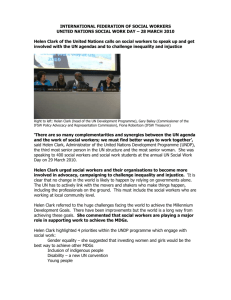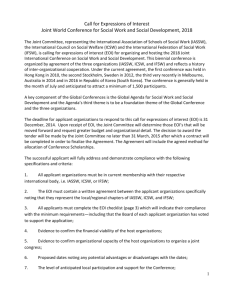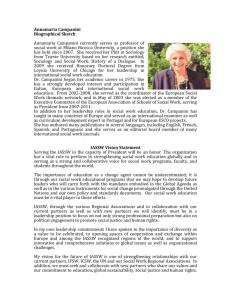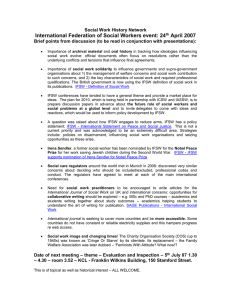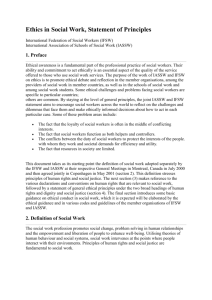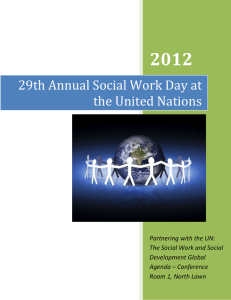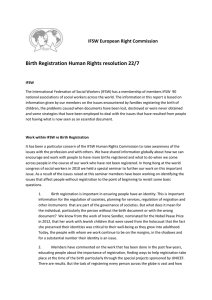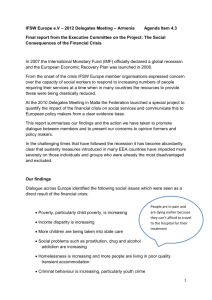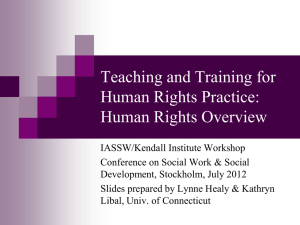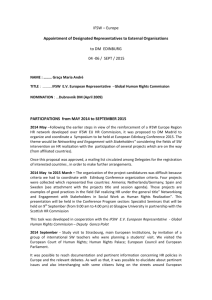Curriculum Guide * International Social Work Janet Williams
advertisement
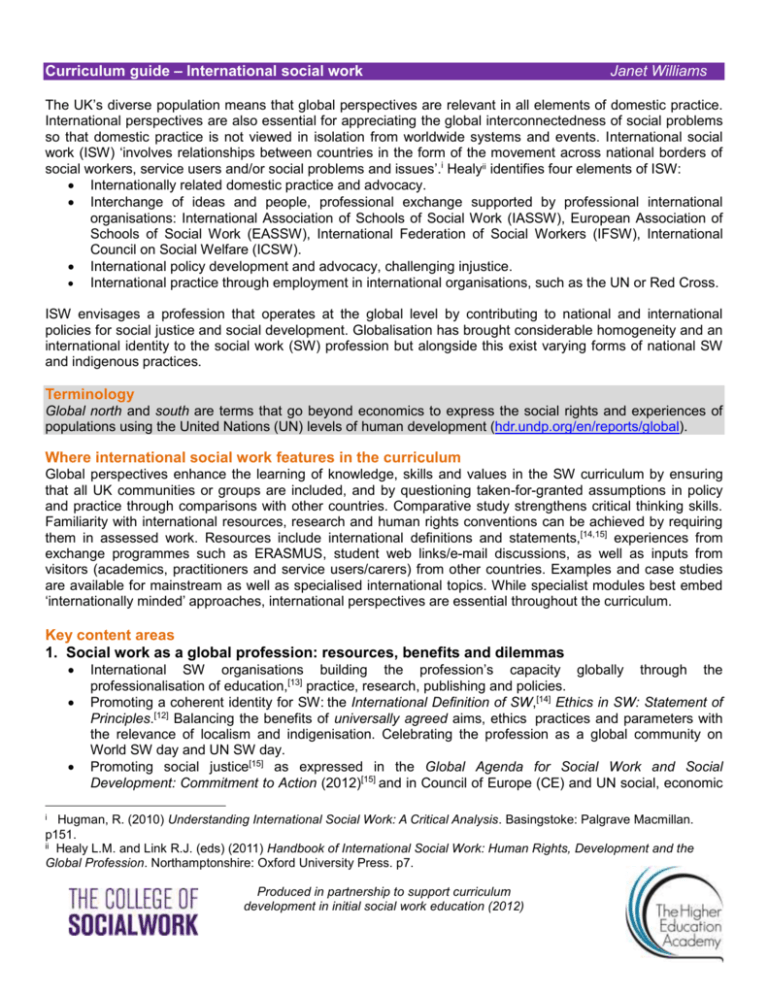
Curriculum guide – International social work Janet Williams The UK’s diverse population means that global perspectives are relevant in all elements of domestic practice. International perspectives are also essential for appreciating the global interconnectedness of social problems so that domestic practice is not viewed in isolation from worldwide systems and events. International social work (ISW) ‘involves relationships between countries in the form of the movement across national borders of social workers, service users and/or social problems and issues’.i Healyii identifies four elements of ISW: Internationally related domestic practice and advocacy. Interchange of ideas and people, professional exchange supported by professional international organisations: International Association of Schools of Social Work (IASSW), European Association of Schools of Social Work (EASSW), International Federation of Social Workers (IFSW), International Council on Social Welfare (ICSW). International policy development and advocacy, challenging injustice. International practice through employment in international organisations, such as the UN or Red Cross. ISW envisages a profession that operates at the global level by contributing to national and international policies for social justice and social development. Globalisation has brought considerable homogeneity and an international identity to the social work (SW) profession but alongside this exist varying forms of national SW and indigenous practices. Terminology Global north and south are terms that go beyond economics to express the social rights and experiences of populations using the United Nations (UN) levels of human development (hdr.undp.org/en/reports/global). Where international social work features in the curriculum Global perspectives enhance the learning of knowledge, skills and values in the SW curriculum by ensuring that all UK communities or groups are included, and by questioning taken-for-granted assumptions in policy and practice through comparisons with other countries. Comparative study strengthens critical thinking skills. Familiarity with international resources, research and human rights conventions can be achieved by requiring them in assessed work. Resources include international definitions and statements,[14,15] experiences from exchange programmes such as ERASMUS, student web links/e-mail discussions, as well as inputs from visitors (academics, practitioners and service users/carers) from other countries. Examples and case studies are available for mainstream as well as specialised international topics. While specialist modules best embed ‘internationally minded’ approaches, international perspectives are essential throughout the curriculum. Key content areas 1. Social work as a global profession: resources, benefits and dilemmas International SW organisations building the profession’s capacity globally through the professionalisation of education,[13] practice, research, publishing and policies. Promoting a coherent identity for SW: the International Definition of SW,[14] Ethics in SW: Statement of Principles.[12] Balancing the benefits of universally agreed aims, ethics practices and parameters with the relevance of localism and indigenisation. Celebrating the profession as a global community on World SW day and UN SW day. Promoting social justice[15] as expressed in the Global Agenda for Social Work and Social Development: Commitment to Action (2012)[15] and in Council of Europe (CE) and UN social, economic Hugman, R. (2010) Understanding International Social Work: A Critical Analysis. Basingstoke: Palgrave Macmillan. p151. ii Healy L.M. and Link R.J. (eds) (2011) Handbook of International Social Work: Human Rights, Development and the Global Profession. Northamptonshire: Oxford University Press. p7. i Produced in partnership to support curriculum development in initial social work education (2012) and environmental committees (e.g. Millennium Development Goals, Social Observatory research, Rio+20 Conference, post-2015 Sustainable Development Solutions Network, the Social Protection Floor). The scope for intellectual and practice exchange through placements, study, research and employment. Practice in other countries, especially those in the global south, and SW responses to social problems through community, remedial, activist, development practices [1,2,3,5,8] and pedagogy. 2. Contextualising poverty and social problems with reference to globalisation Globalisation: lives and cultures transforming through accelerated (technological) changes in communication, travel, trade (goods and people), movement of investment, jobs, services and people.[6] Impact: growing inequality (between and within countries), environmental and human exploitation. The evidence that economic inequality harms everyone in society by increasing social problems. [10] The impact of past colonialism and current economic, linguistic and cultural influences (neocolonialism). Questioning the efficacy of foreign aid when it is based on measures that increase poverty (austerity and economic restructuring);[15] the risk and ethics of increased dependency. Supporting gender equality and women-focused, indigenous responses through social development.[15] The rise of and resistance to rich-friendly (neo-liberal) economic policies. The importance of government, and maintaining revenue for redistribution to health and welfare services, living wages and social protection. Why human and environmental disasters occur;[4] the impact on poor people, migration and social stability. Roles for social workers in environmental emergencies and in areas of political conflict.[9] 3. International perspectives in UK social work practice The impact of poverty, relative poverty and inequality on the prevalence and nature of social problems in the UK;[10] making links between the UK’s foreign and domestic policies and global inequality. How social problems are constructed and responded to in other countries and cultures by comparing the UK with other countries and their welfare regimes. Migration (the reasons for global, regional and local movements of people, and evidence-based global comparative migration statistics) in order to contextualise political rhetoric, government responses and to challenge racism, myths and discrimination, in self and among colleagues. Human rights (UN and European Conventions), and their role in helping to prevent poverty, kidnapping, political conflict and war, genocide, torture, territorial oppression and land grabbing, oppression, slavery, natural and human disasters in the environment. How domestic organisational policies, professional guidance and protocols incorporate international law and conventions and impact on local practice. Support for members of a diaspora in the UK, and abroad, when service users’ needs cross borders. ‘Act in the best interest of the child’; prioritising eligibility as children (e.g. unaccompanied asylum seeking children, child soldiers, trafficked children). Support individuals affected by injustices in the asylum system, e.g. abuse, lack of financial support, restrictions on work and challenges to sexual orientation. How incomers are subject to media attention, politically orientated moral panics, labelling and social exclusion while experiencing surveillance, violence and marginalisation; applying sociological theory. Challenging oppressive attitudes and policies towards international service users (e.g. immigrants, asylum seekers, Roma and travellers) with reference to rights and professional values. Produced in partnership to support curriculum development in initial social work education (2012) Ethical reasoning skills for moral dilemmas arising in practice: ‘law breakers’ (persons trafficked or smuggled) needing protection under the law; respecting cultural practices while upholding human rights. Professional role and values; avoiding cultural relativism.[1] Ensuring protection of persons subject to abusive cultural practices (genital cutting, forced marriage, witchcraft and honour killing). Awareness of mental distress following forced migration, while not underestimating resilience. Understand stresses before, during and after arrival (stemming from uncertainty, stigma, violence, fear, loss, marginalisation and trauma) that can undermine identity and hope. The relevance of mutual support and informal networks for maintaining mental wellbeing. Skills and capabilities: inter-cultural communication, working with interpreters, explaining professional roles and UK laws to international service users, awareness of need for mediating skills in community conflicts.[9] 4. Social work, sustainability and the environment The scope of eco-social work/environmental social work.iii Environmental justice, advocacy and citizenship.[4] Empowerment in decision making about the location of toxic waste, industry, city traffic, housing and motorways, dams and agricultural practices and for measures related to climate change and the sustainable use and distribution of local and global resources. Challenging habitat destruction to ensure the sustainability of affordable food and biodiversity; maintaining air, water and soil quality to sustain local livelihoods for rural communities, marginal and tribal groups. Sustainable communities contributing to health (as a human right) through control over noise, air quality and the provision of safe built environments, green and community spaces; affordable housing and fuel. Links to other curriculum areas including other guides () Migration and refugees () Mental health (): cultural constructions of mental distress, respectful responses, challenging stigma. Children and families; UN Convention on Rights of the Child, constructions of childhood, developmental stages, determining age in the asylum process. Human growth and development (), Social work law (): parental responsibilities in the UK and grounds for state intervention. Adults, elders and disabled people (): transitions, identity and challenges to life course expectations, constructions of capacity for consent to marriage. Ageing ‘in place’ in the UK, abroad or returning home. Physical health (): health inequalities and rights, globalisation and disease spread, stigma and services. Key resources 1. Banks, S.J. and Nohr, K. (2011) Practising Social Work Ethics around the World: Cases and Commentaries. London: Routledge. 2. Bettman, J.E., Jacques, G. and Frost, C.J. (eds) (2013) International Social Work Practice: Case Studies from a Global Context. London: Routledge. 3. Cox, D. and Pawar, M. (2013) International Social Work: Issues, Strategies and Programs (2nd ed.). London: Sage. iii Coates, J. and Gray, M. The environment and social work: An overview and introduction in International Journal of Social Welfare 2012;21:230-238. Produced in partnership to support curriculum development in initial social work education (2012) 4. Dominelli, L. (2012) From Environmental Crises to Environmental Justice. Cambridge: Polity Press 5. Harrison, G. and Melville, R. (2012) Rethinking Social Work in a Global World. Basingstoke: Palgrave. 6. Lawrence, S., Lyons, K., Simpson, G., Huegler, N. (eds) (2009) Introducing International Social Work. London: Sage. 7. Lyons, K., Hokenstad, T., Pawar, M., Huegler, N., Hall, N. (eds) (2012) The Sage Handbook of International Social Work. London: Sage. 8. Midgley, J. (1995) Social development: The developmental perspective in social welfare. London: Sage. 9. Ramon, S. (2008) Social Work in the Context of Political Conflict. IASSW: Venture Press. 10. Wilkinson, R. and Pickett, K. (2010) The Spirit Level: Why Equality is Better for Everyone. London: Penguin. 11. European Association of Schools Social Work www.eassw.org 12. IASSW/IFSW (2004) Ethics in Social Work: Statement of Principles. http://www.iassw-aiets.org 13. IASSW/IFSW (2004) Global Standards for the Education and Training of the Social Work Profession. http://www.iassw-aiets.org/global-standards-for-social-work-education-and-training 14. IASSW/IFSW (2001) International Definition of Social Work http://ifsw.org/policies/definition-of-socialwork/ 15. IASSW/ICSW/IFSW (2012) The Global Agenda for Social Work and Social Development: Commitment to Action. http://www.globalsocialagenda.org/ http://ifsw.org/get-involved/agenda-for-social-work/ Produced in partnership to support curriculum development in initial social work education (2012)
